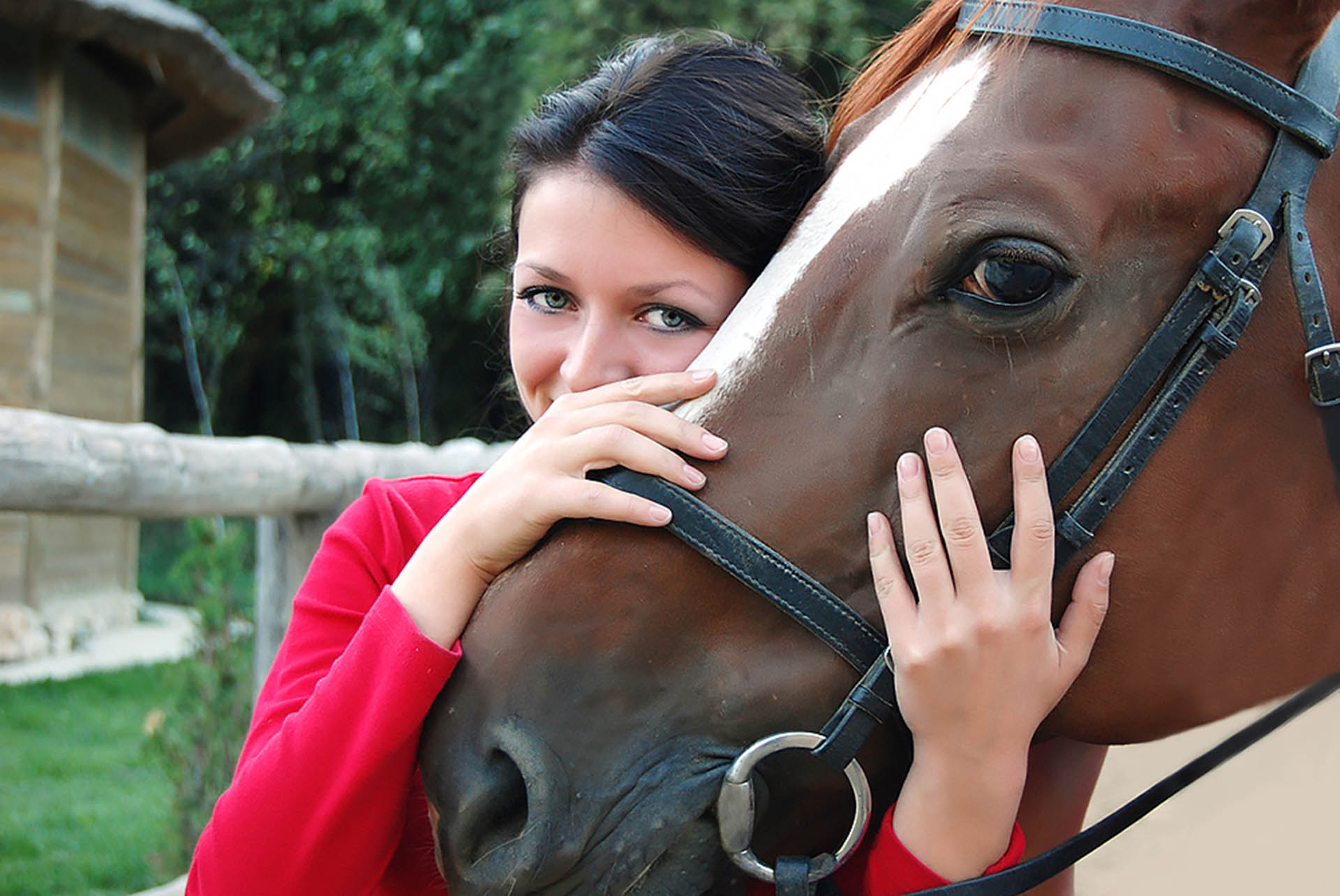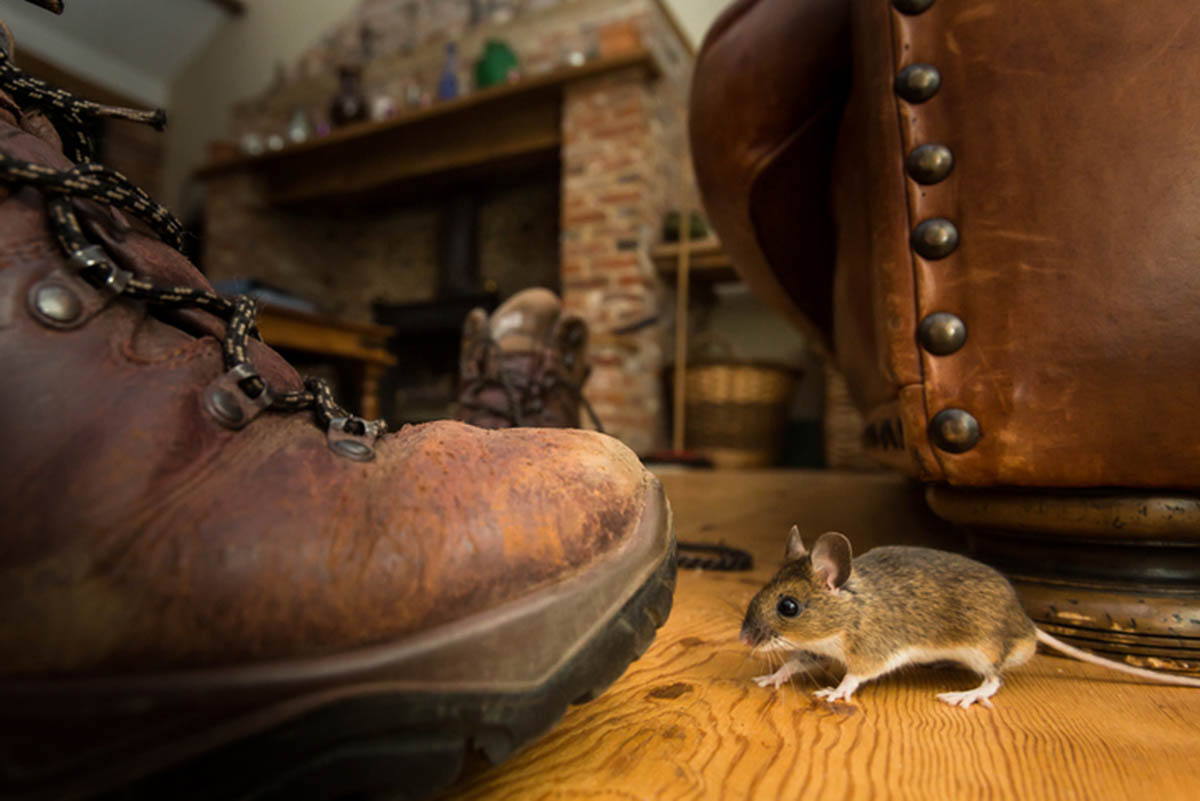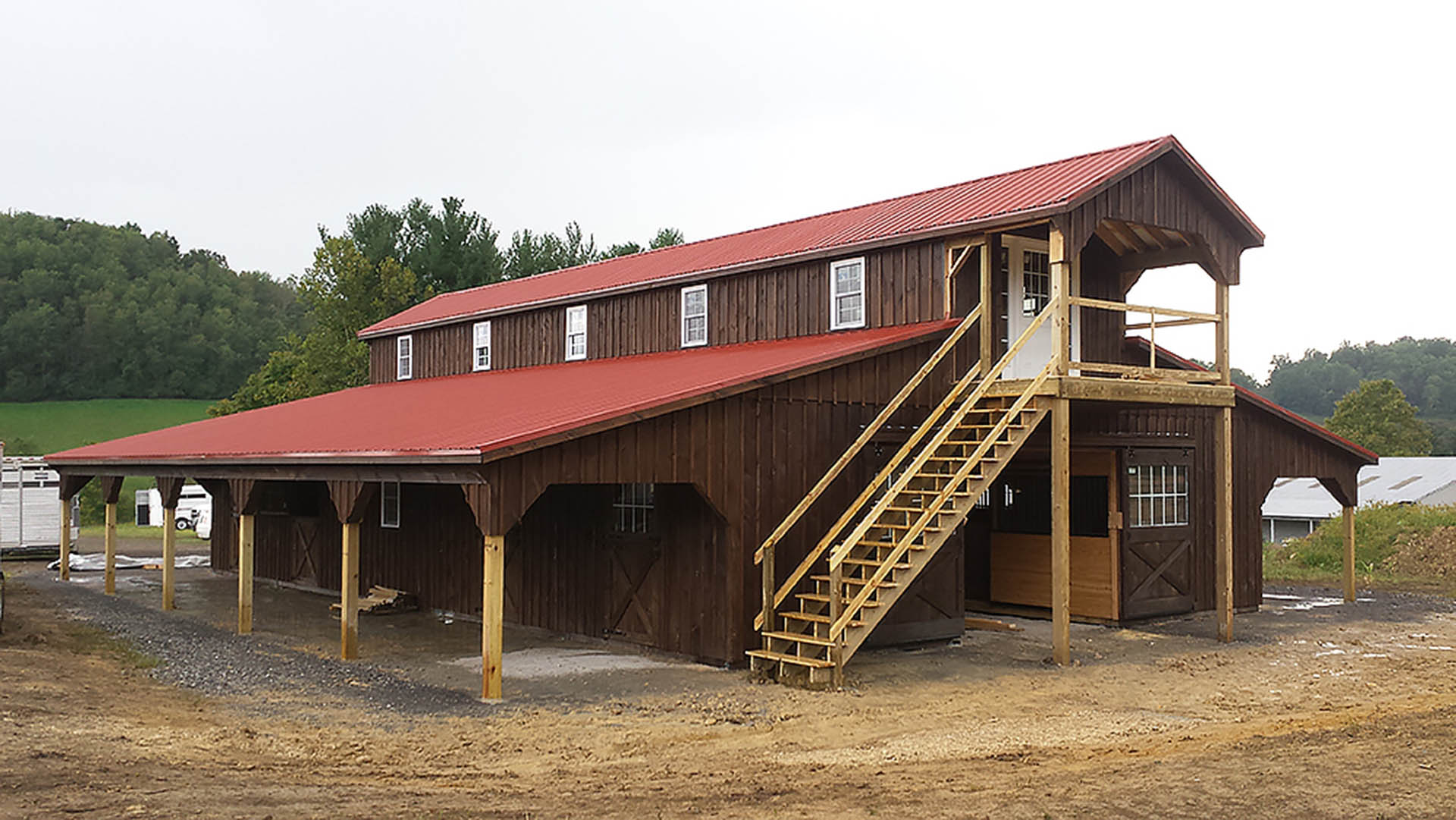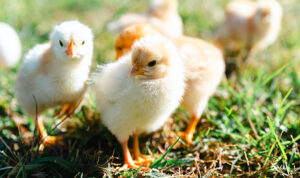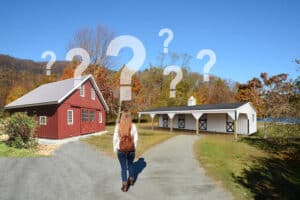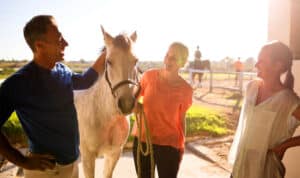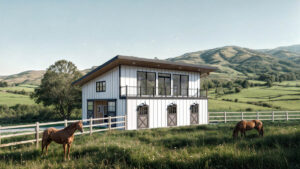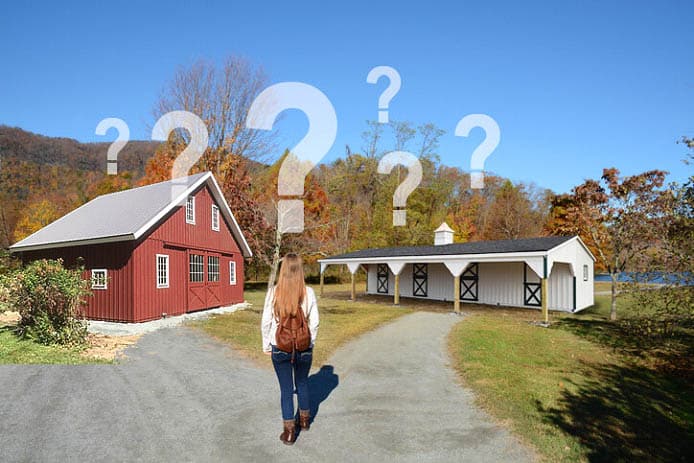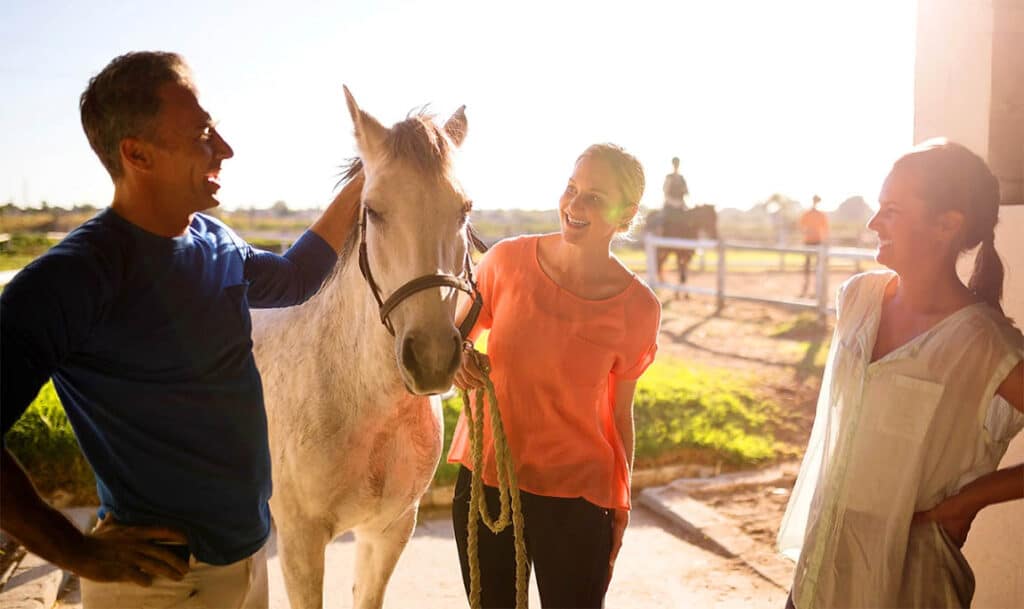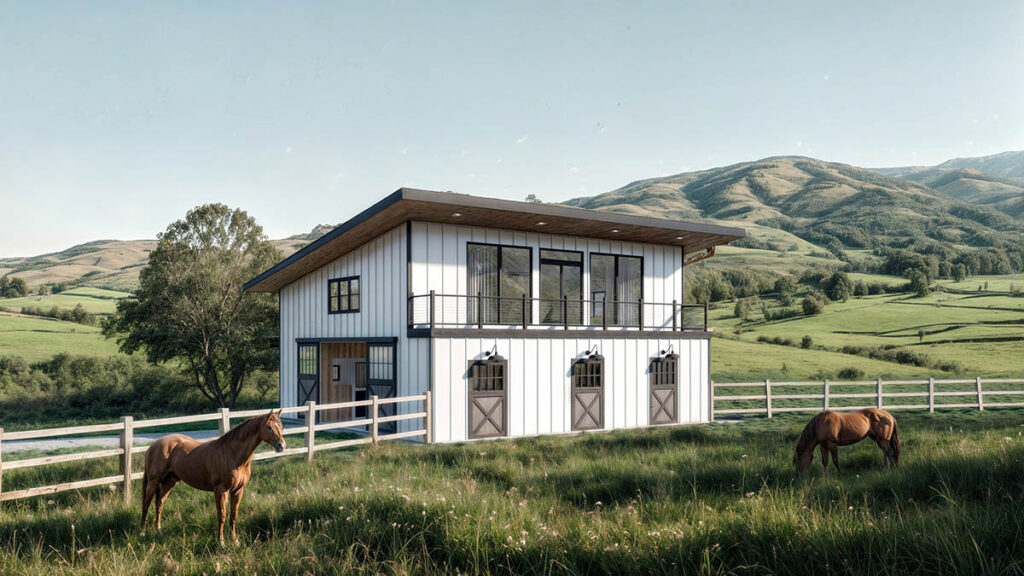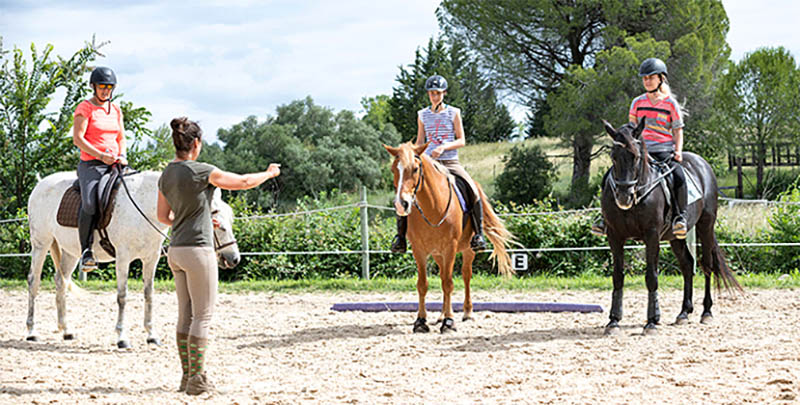If you are planning on building a horse barn with an apartment this is the perfect time of year to make your purchase and get your order on the books. The decisions that you make in the planning stages will obviously directly impact the form, function and fit of the barn for your horse business or individual needs. So make the best decisions possible by ensuring those decisions are informed and realistic.
The romance of living with our equine partners is an attractive picture for many passionate horse owners. Heads up! The reality can be a bit different. As a horse breeder for over 25 years, I’ve spent my share of time bunked up in the aisleway waiting for mares to deliver their foals or monitoring poorly foals in their stall propped up on a bank of straw with their heads in my lap trying not to doze off. During my show career in dressage in Europe, I’ve also slept in living quarters in huge horse transport boxes with horses adjacent and slept on cots in the aisle of barns at showgrounds keeping a sleepy eye on horses that are recovering from a slight colic episode. These experiences have taken a bit of the romance out of the idea of sharing space too closely with horses.
Let’s take a look at some pros and cons of living with horses that you should consider before purchasing a horse barn with an apartment.
Health and Hygiene
If you choose to construct an apartment for yourself, family or a groom or employee that is placed within the regular barn structure, either on the same level or above the horse stalls/tack room and storage areas then be cognizant that horses have other critters that like to come visit that are not invited. The vermin population!
If you are not a Dr. Dolittle at heart, then the presence of noisy mice and rats that scratch away in the walls while you try to sleep, visit your kitchen countertops and quickly build their nests in your soft furnishings, may not be easy to live alongside. Sure, a hunting feline or two will help, but it may not solve the issue.
You can seal buildings to try and eradicate the issue, but the equine environment with its open doors, feed rooms, hay storage and dry bedding will encourage vermin and other animals to investigate and take up residence. Possums, martens, rabbits, raccoons, squirrels, and other critters may also make an unwanted appearance. While you can seal doors to the apartment space and keep them shut, it is hard to prevent the little mites from sneaking up walls and into tiny spaces.
And talking of mites, the insect population may also become an issue. Flies and other insects will enjoy taking a tour of your living arrangements.
Dust and dirt will also invariably find its way into your apartment. With the beautiful aroma of horses and hay, may come allergies and a major amount of housekeeping chores.
Noise
The inevitable banging of horses in their stalls at night, the occasional horse becoming cast for a moment, mangers and doors being kicked, snorting, coughing etc. are all part of daily life around horses.
You may not mind those noises when you are walking the aisleway during your daily barn chores but when you are trying to get some quality shut-eye in before the big horse show, these noises can become extremely distracting.
Additionally if you are trying to rest up due to illness or trying to take a much needed lay in, your boarders will be happy to keep you awake with their activities in the barn and cheery chatter. We all love the sound of the clip clop of hooves, but not necessarily at 5 a.m. when someone decides their horse should be turned out or brought in early for riding. And don’t forget the hum of clippers, horse vacuums and traffic in the parking lot.
Onsite Means On Call 24/7
While being immediately on site can be useful for security purposes and for foal watch and other medical issues that require monitoring, the advent of video monitoring has alleviated some of these concerns.
On a plus side you don’t have to commute to work in inclement weather if your horse barn is your business.
If you operate a boarding facility you can expect that your clientele will happily knock on your door to ask random questions or engage you in chat. When a boarder asks if you can have their horse turned out early for whatever reason or makes other requests, it is hard to say no when you are obviously present on site.
It is beneficial to have a different environment to retire to after a hard days work, which we all know the horse industry requires, where you can relax and kick back.
Permits Provide Safety
If you build a horse structure it will be built to agricultural standards. This means to add a residential purpose to the building, you will almost certainly need a different set of standards incorporated in order to meet local town ordinances. Hence the need for permits. The stricter standards for residential use are there for your safety.
While you can have a horse barn built to agricultural standards and try to sneak in a residential area at a later time, be aware that this residential use may void your insurance coverage and most certainly will negatively affect your ability to resell the property down the road, as you will need a change of use and a Certificate of Occupancy update. These changes may be costly to effect after the initial build has been completed to an agricultural standard and you may be charged penalties for non-compliance during your ownership of the property.
Also consider that with living quarters comes the need for heat, hot water, cooking and bathing facilities. You are thus adding risks for burst water pipes and fire hazards to your horse barn. Insurance companies will rightfully require a higher premium for this liability coverage.
A building with a residential component will also necessarily be more expensive to build that an agricultural structure. When you do the math and include all the relevant expenses and requirements, you may find it is actually cheaper to build two separate structures than to try and blend residential with animal use.
In conclusion, you may not mind all of the above negatives to living with horses but your family and friends might. If you do determine that you want to live within the horse barn structure take relevant precautions to make it work as positively as possible.
At Horizon Structures the team has built it all. Your own questions and concerns won’t necessarily fall into the realm of FAQ’s. It is very important that you ask questions of your builder and your local building inspector and make sure they are on the same page.
At Horizon Structures the friendly and professional staff are available to share their experience and offer their thoughtful advice on any horse barn building design or topic you may have and most importantly will deliver a high quality horse barn product in a timely manner.
There are areas on our lives where we love surprises. When it come to your horse barn I’m not sure you want any surprises, which is why knowing which questions to ask is so important. When you work with a company such as Horizon Structures, where the team are experienced horse people and construction professionals, you are provided with lots of great ideas and asked pertinent questions that can expand not just your imagination but also save you money and heartache down the track.
The time, effort and hard earned dollars you invest in your new building project, whether it is a horse barn, an outdoor structure of any type, or a dog kennel, warrants respect and consideration from the builder you choose. Horizon Structures build their beautifully crafted Amish structures with a keen eye on your budget, safety needs and welfare of your horse(s) and will never try to sell you on something that will not pass the vetting of your local officials. Of course, what you do after something is built is entirely your call.


